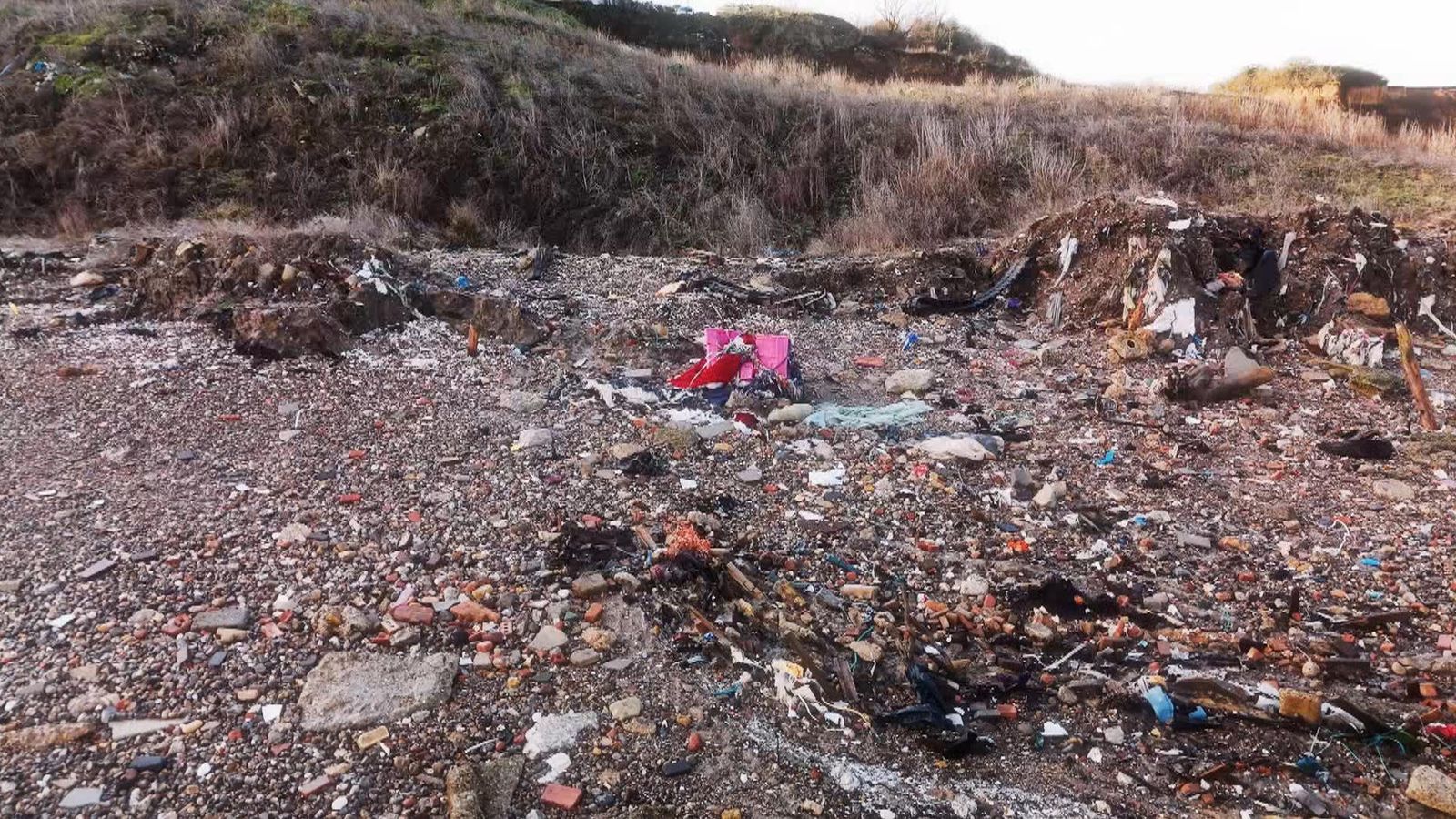U.K News
Lorries dumped waste on beach – as Sky News told gangs can ‘make millions’ from illegal tipping

The Scourge of Illegal Dumping: A Threat to Communities and the Environment
On a crisp February morning, a group of volunteers gathered at Minster Beach on the Isle of Sheppey in Kent. Dressed in warm hats and sturdy boots, they armed themselves with litter pickers and blue plastic bags. Their mission? To tackle a growing environmental crisis that has plagued the coastline for years. The volunteers were not just cleaning up ordinary litter; they were confronting a far more sinister problem: illegal dumping on an industrial scale. Between 2020 and 2023, lorries dumped massive amounts of builders’ rubble, shredded household waste, and other debris at an illegal site near Eastchurch Gap, just a few miles away. This toxic waste has since been carried by the tides, scattering the shoreline with guttering, pipes, plastic fragments, and other hazardous materials. For the volunteers, the task is both heartbreaking and never-ending.
The Devastating Impact on Marine Life and Communities
The volunteers’ efforts are heroic, but the scale of the problem is overwhelming. Belinda Lamb, who organizes the clean-ups, describes finding shredded Christmas trees, bits of carpet, and even spongy material from playgrounds. "It’s really sad," she says. "This waste is having a huge impact on marine life—and probably on our lives too." The connection between ocean pollution and human health is stark: if fish are consuming plastic and other toxins, so are the people who eat them. The locals are not just angry; they feel betrayed. Despite their monthly clean-up efforts, the sea continues to wash in more debris, leaving them to wonder if the area—a Site of Special Scientific Interest—will ever recover.
A Criminal Enterprise: Organized Gangs and Waste Crime
The dumping at Eastchurch Gap is no isolated incident. It is part of a broader epidemic of waste crime that is being exploited by organized criminal gangs. These gangs are drawn to the waste industry because it is a low-risk, high-reward endeavor. They operate with alarming impunity, often involved in other criminal activities such as money laundering and human trafficking. According to Sam Corp of the Environmental Services Association, one-fifth of all waste in England—approximately 34 million tonnes annually—is illegally managed. This staggering figure equates to about four million skips’ worth of rubbish, costing the economy around £1 billion yearly. For legitimate waste operators, the damage is even worse, with an estimated £3 billion lost to missed business opportunities.
How Criminals Profit from Waste
The mechanics of waste crime are simple yet brazen. Criminal gangs pose as legitimate waste management operators, charging businesses to collect and dispose of their rubbish responsibly. Instead of fulfilling their obligations, they dump the waste illegally, pocketing the profits. Obtaining a waste licence is disturbingly easy, requiring little more than £154. This loophole allows gangs to operate under the radar, amassing hundreds of thousands—even millions—of pounds. Meanwhile, the consequences for getting caught are minimal. Fines are so low that criminals treat them as a mere "business expense," deterred neither by the penalties nor the risk of prosecution.
The Struggle to Enforce the Law
The Environment Agency, tasked with combating this crisis, faces an uphill battle. Despite the severity of the issue, the agency’s annual budget for addressing waste crime is a paltry £10 million—a fraction of the £1 billion needed to tackle the problem effectively. Of the 1,453 illegal dump sites recorded in the last decade, only 64 resulted in any form of enforcement. Just 13 cases led to prosecutions, while 319 sites were linked to organized crime, and 130 involved hazardous waste. These stark numbers highlight a system that is woefully inadequate in deterring waste criminals. As Sam Corp puts it, "We need regulations to be much tougher, stronger, and more strongly enforced."
Fighting Back Against Waste Crime
While the situation seems dire, there is hope. The Environment Agency has made strides in recent years, shutting down 462 illegal waste sites in 2023 alone—a record low for the number of operational sites. A spokesperson called waste crime "toxic," vowing to "make life harder for criminals through tough enforcement action and prosecutions." For the volunteers at Minster Beach, their monthly clean-ups are a testament to community spirit and resilience. But without systemic change, the battle against illegal dumping will remain an uphill fight. The story of Eastchurch Gap serves as a stark reminder of the urgent need for stronger laws, better enforcement, and greater public awareness to protect our environment—and ourselves—from the scourge of waste crime.
-

 Tech2 days ago
Tech2 days agoCanon’s New Camera Is in a Category Once Thought Practically Dead
-

 Entertainment6 days ago
Entertainment6 days agoKhloe Kardashian Says Mom Kris Jenner ‘Gets Mad at Me’ for Wearing ‘Baggy Sweats’ Out of the House
-

 Money6 days ago
Money6 days agoCal Newport’s Productivity Hack That Can Also Help You Escape Financial Burnout
-

 Tech7 days ago
Tech7 days agoBest Internet Providers in Cincinnati, Ohio
-

 Sports3 days ago
Sports3 days agoChargers to play 2025 regular season opener in Brazil
-

 Tech5 days ago
Tech5 days agoBest AirPods Max Accessories for 2025
-

 World7 days ago
World7 days agoHow to Watch USA vs. Cuba: Live Stream 2025 Concacaf U-17 Men’s Qualifiers, TV Channel
-

 Tech2 days ago
Tech2 days agoBest Vitamins for Healthy Hair, Skin and Nails in 2025


















